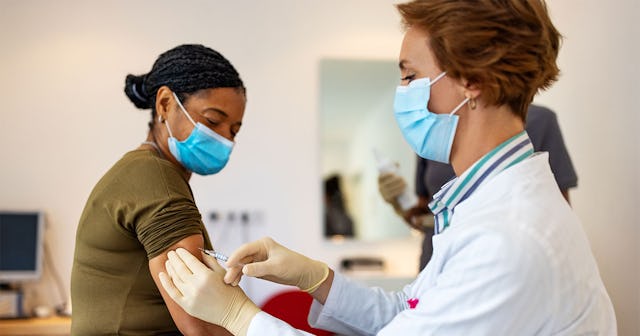What Your COVID Vaccine Side Effects Can Tell You About Your Immune Response

The first thing I did when I joined the ranks of the vaccinated was celebrate. The second thing I did was brace myself. Friends who’d gotten vaccinated before me told me their day-after horror stories of sleeping the day away, feeling terribly ill, suffering fevers and headaches and more. I prepared myself. I cleared my day and worried over how I’d care for my kids if I couldn’t get out of bed.
As it turns out, the bracing and worrying was for nothing. I was fine. Great. So completely unaffected by the prior day’s vaccination that I worried maybe the person who’d administered it had missed. Or maybe she hadn’t missed, but I was in the small percentage of folks who never developed an immune response.
Since then, upon hearing about the side effects those who’ve been vaccinated after me are experiencing, my response is a mix of hope (because the more vaccinated folks the better) and jealousy. Because to me, side effects equal proof that the vaccine worked.
Fortunately (for me) that’s actually not the case. Your COVID vaccine side effects aren’t a predictor of how well the vaccine is working in your body.
Our Immune Systems Are Complex
Our immune system response to vaccines is created by two different systems.
The first response is the innate immune response. “Your innate immune system is the one that locates an infection and attacks it,” writes Thaddeus Stappenbeck, MD, PhD, Chairman of the Department of Inflammation and Immunity at Cleveland Clinic’s Lerner Research Institute.
The innate immune response is activated when your cells realize you’ve been exposed to a foreign material. They attack with the goal of eliminating the foreign material. That attack manifests as fever, sore arm, or muscle aches, according to Stappenbeck. This initial response is usually short-lived, lasting a few hours or days.
The adaptive immune response is the second part of the immune response and is arguably more important. The adaptive immune system is responsible for the long-lasting response. It activates your body’s T and B cells, which learn to recognize specific foreign materials, like the COVID spike protein. The T and B cells are the ones that then identify the foreign material months or years after the initial infection or vaccination and generate the antibodies to attack and eliminate the invader.
With respect to COVID-19 vaccines, the adaptive immune response takes about two weeks to develop. This is why experts say you don’t have full protection from COVID immediately after receiving your final vaccine dose despite developing side effects within hours or days.
Side Effects (Or A Lack Thereof) Are Not An Indication Of Immune Response
Eugene Mymrin/Getty
By now, we all know the potential side effects of the COVID-19 vaccines. They’ve been written about and discussed by dozens of experts on a variety of forums. The outstanding question is: what does it mean if you don’t have any side effects? Are you as protected from infection as someone who did have side effects?
The short is “yes, absolutely.” There’s no scientific evidence that more obvious side effects are correlated with better protection. In an interview with MedPage Today, Robert Schooley, MD, of the University of California San Diego, confirmed “People who don’t have a sore arm shouldn’t assume they’re not protected, and those who do have a sore arm shouldn’t assume they’re more protected than others.”
Trial data confirms this answer, too. The vaccines were 94% effective, but only about half of the participants experienced side effects. The takeaway is side effects are not proof of immunity or lack thereof.
One Shot Might Provide Enough Protection For Those Who’ve Had COVID
According to new research from the Penn Institute of Immunology, if you’ve already had COVID, one shot might provide you with enough protection. The study found “little immune benefit after the second dose” in those who’d been previously infected.
Researchers studied the antibody and memory B cell responses from 44 individuals. Eleven of those individuals had previously been infected with COVID. They showed a strong antibody and memory B cell response after a single dose of a mRNA vaccine. In contrast, those who hadn’t previously been infected with COVID required two doses to reach “optimal levels of immunity.” The results held true even against the COVID variants.
The study also highlighted the importance of memory B cells (that adaptive immune system) with respect to future antibody response. Senior author of the Penn study E. John Wherry, PhD, chair of the department of Systems Pharmacology and Translational Therapeutics and director of the Penn Institute of Immunology in the Perelman School of Medicine at the University of Pennsylvania confirmed the importance of memory B cells. He noted, “We need to make sure people have the strongest memory B cell responses available. If circulating antibodies wane over time, our data suggests that durable memory B cells could provide a rapid source of protection against re-exposure to COVID-19, including variants.”
Despite this study, those who’ve previously had COVID should speak to their doctors before deciding to skip their second dose of vaccine. The key goal of vaccination is immune response and until we know more, it’s probably not a good idea to make medical decisions without the input of a healthcare professional. Especially with variants circulating.
After all, the ultimate goal is protection. And when it comes to these vaccines, they are astonishingly good at providing that—whether or not you have obvious side effects.
This article was originally published on